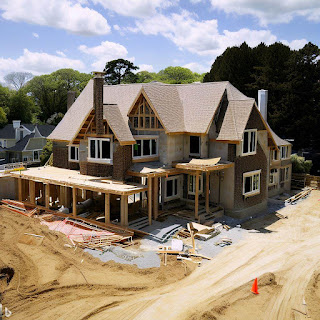Construction management is a vital aspect of the
construction industry. It encompasses the planning, coordination, and execution
of construction projects from inception to completion. A construction manager
plays a crucial role in ensuring that projects are completed on time, within
budget, and to the required standard of quality.
One of the primary roles of a construction manager is to
oversee and manage all aspects of a construction project. This includes
developing a project plan, creating a budget, coordinating with subcontractors
and suppliers, managing schedules, and ensuring that all work is carried out
safely and to the required standard. They are also responsible for ensuring
that all necessary permits and licenses are obtained and that all work complies
with building codes and regulations.
Construction management is relevant in both commercial and
residential real estate development. In commercial real estate, construction
managers may be responsible for managing the construction of office buildings,
retail spaces, hotels, and other commercial properties. In residential real
estate, construction managers may oversee the construction of single-family
homes, apartments, and other residential properties.
There are several areas where construction management is
needed, including design, estimating, scheduling, project controls, and
construction supervision. In the design phase, a construction manager may work
with architects and engineers to ensure that the design of the project meets
the client's requirements and is feasible within the project's budget and
timeline.
In the estimating phase, a construction manager may work with
estimators to create accurate cost estimates for the project. During the
scheduling phase, the construction manager may work with project schedulers to create
and maintain a project schedule that ensures that the project is completed on
time. In the project controls phase, a construction manager may work with
project controllers to ensure that the project is completed within the budget
and that any changes to the project are properly documented and communicated.
In the construction supervision phase, a construction manager may work with
subcontractors, suppliers, and other construction professionals to ensure that
the project is completed to the required standard of quality.
Construction managers collaborate with a wide range of
professionals throughout the construction project. They may work closely with
architects, engineers, and designers during the design phase to ensure that the
project is feasible and meets the client's requirements. During the
construction phase, they may work with subcontractors and suppliers to ensure
that work is carried out safely, to the required standard, and within the
project's budget and timeline. They may also collaborate with project owners,
project sponsors, and other stakeholders to ensure that the project is aligned
with their goals and objectives.
In conclusion, construction management is a critical aspect
of the construction industry. It encompasses a wide range of roles and
responsibilities, including project planning, budgeting, scheduling, project
controls, and construction supervision. Construction management is relevant in
both commercial and residential real estate development and is necessary in
areas such as design, estimating, scheduling, project controls, and
construction supervision.
Construction managers collaborate with a wide range of
professionals throughout the construction project, including architects,
engineers, designers, subcontractors, suppliers, project owners, and other
stakeholders. A construction manager plays a vital role in ensuring that
construction projects are completed safely, on time, within budget, and to the
required standard of quality.Top of
Form



